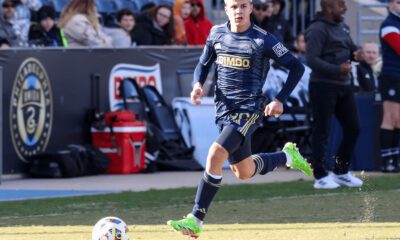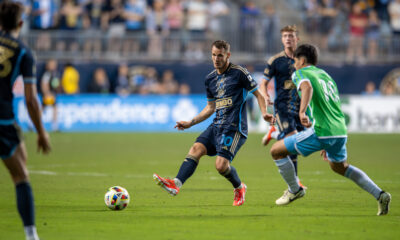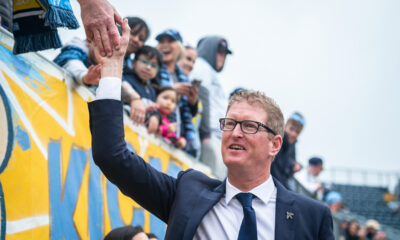Brotherly Game Archive
Mikael Uhre relies on his experience to adjust to life in MLS
The danish forward has 8 goals in his 16 games played for Philadelphia
Mikael Uhre is finding his goal-scoring form. That sentence in itself should strike fear in every future Union opponent in the Eastern Conference. The former Danish Superliga Player of the Year has scored five goals in five games and has proved to the Philadelphia Union fanbase that he is indeed the missing attacking piece, a quality DP striker with the work rate to win the ball defensively, the pace to beat opponents off counters, and the skill and poise to find the back of the net.
Uhre’s two goals against the Houston Dynamo in last Saturday’s 6-0 win, his seventh and eighth of the season, tied him for second on the team and tied for seventh in the league. Playing only only 867 minutes, he ranks third in MLS with .83 goals per 90 minutes behind LA Galaxy’s Dejan Joveljic (1.24) and DC United’s Taxi Fountas (.89), and his 75% shooting percentage (shots to shots on target) leads the league by a healthy margin. His 33% shot conversion rate (shots to goals) ranks second behind Joveljic (39.1%), which means he’s one of the most efficient strikers in MLS. Not bad for a guy who last week played his sixteenth game of the MLS season on top of two games in Champions League qualifying, five games in the Europa League, and sixteen games in the Danish Superliga, where he was the leading scorer with 11 goals before joining the Union in January.
Early in the season, when wins and goals were difficult, it may have been easy to raise the magnifying glass to Uhre. After a challenging MLS acclimation, delayed by visa issues, lifestyle changes, and injury, Uhre came out of June’s international break scoring seven goals in ten games, including a brace in the Union’s record-setting 7-0 win over DC before another brace in the recent win over Houston. It’s safe to say the transitional period is behind him, thanks to a positive mindset and relentless work ethic, and if anyone had concerns over his early performances, Uhre was not among them.
“It’s actually quite easy to stay positive when you know that you get the chances,” Uhre told Brotherly Game after training this week. “I think the hardest games for me have been the ones where I didn’t create anything.” In Uhre’s first appearances, he generated chances off transitions and breakaways, but many were stopped by deflections, acrobatic saves, goalposts, and his own slight misses. “You know that if you keep getting to change it, then eventually it’ll pan out and you’ll start scoring goals. So that’s been my mentality just to try to keep getting chances because then I know I’m going to score.”
What’s most impressive about Uhre may be how quickly he’s adapted, though in the beginning, even he admits it wasn’t the case. “It’s been quite hard,” he said. “Obviously going from a safe place where you know everything and how everything works and then going over here where you’re kind of brand new to everything. And then becoming a father in the process was also really hard, not having the grandparents and my mom and dad around. So that was tough.”
Uhre and his wife, Amalie, welcomed a daughter in December, adding to the role of newlywed parents to the journey across the Atlantic. “We’ve gotten out on the other side, and it’s really great. Now we enjoy life a bit more and we’re also a bit over the hard phase with the baby, so it’s getting better and better every day.”
Uhre found the adjustment period off the field affecting his performance on the field, where he was determined to make an immediate impact. “It’s definitely easier to play a game when you’re in balance outside the pitch,” he said. “You can’t be in balance all the time. And sometimes you have to step out on the ice and see if it breaks or not. It didn’t break.”
In a post-training media session this week, Union coach Jim Curtin took some responsibility for his record signing’s patchy indoctrination into the league. “Mikael came to a new club, new culture, you know, with different kinds of self-imposed pressures that any good striker puts on themselves to get goals,” he said. “Part of it was we trained him too hard too fast and it caused an injury and that had a big setback on just his preparation and training. And obviously, you’ve seen that as he gets healthy, the damage he can do in our league.”
Pushing through change and adversity is nothing new for Uhre. He made his pro debut in 2013 with SönderjyskE at the age of 18. Two seasons later, he was loaned to First Division Skive IK, where his career path was put to its strongest test. “I came from playing full-time professional in the Superliga to going into the first division and having to get up and work in the morning before driving off to training and being home by 10 in the evening.” Working an office job from eight to twelve in the morning, Uhre began to question if he’d fulfill his dream of playing at the highest level. “It’s all about just keep going and then just trying to start to believe in yourself. It can be hard sometimes, it can be dark sometimes when it’s not really going your way.”
A year later, Uhre scored 15 goals for Skive in all competitions, earning the club’s promotion to the Superliga. Two years later, Uhre moved to Brøndby, amassing 48 goals in 122 appearances, culminating in the 2020-21 title season in which he won the Golden Ball as well as the Player of the Season. But he still thinks positively of his time in the office. “I found out how much I really love football and again, what doesn’t kill you makes you stronger.”
Despite being the Union’s most expensive transfer ($2.8 million), Uhre’s not satisfied with just scoring goals. Both he and Curtin spoke within the past week about a meeting in which Uhre asked his coach how he could improve. “I give him a ton of credit for coming into the office and just asking after the Orlando game how can he get involved more?” Curtin said. “In that game he only touched the ball I think ten times, which for a striker of his quality isn’t enough.”
Against Orlando, Uhre failed to register a shot or create any scoring chances. “Part of it’s on the other players to get him the ball,” Curtin said, “part of it’s on his movement and doing a better job of not just working so hard defensively, and then only running in behind, and doing it when you’re exhausted, finding different ways to now come off the center backs, maybe connect a few passes in midfield, drop a little deeper to then set up the next move, which is to go behind the center back the next time.”
Uhre responded by doubling his touches and attacking different spaces, which led to two goals, the first on a delayed run into the box, burying Olivier Mbaizo’s cross into the top corner. His second came off a superb run behind the Houston center backs, allowing Alejandro Bedoya’s pass to carry before striking the ball with the outside of his right foot. “I’m always trying to find ways to develop my game,” Uhre said. “Because I know I’m lethal when I’m running against the back line and going deep. I think it’s always something I’m trying to build on and always trying to strive to be a better football player.”
Curtin was happy to see the meeting’s progress. “You saw him score goals against Houston that were really indicative of a confident forward. He combined in midfield, he still worked hard defensively, but then he set up the center backs and by the end of the game, and the start of the second half especially, he’s running behind on breakaways, which really suits his skillset.” But Curtin is also quick to downplay any issues with Uhre’s performances. “It wasn’t a crisis or anything because he was still scoring goals in the other games as well. But to recognize how can I even take it to another level? I think that little meeting went a long way for both of us, for me and Mikael. Getting him the ball a little bit more hopefully now this propels us the rest of the season.”
Danish football reached the global spotlight during last season’s European championships for its courage and compassion, as players and supporters dealt with the devastating collapse of Christian Eriksen in the opening match against Finland, but the country has had a longstanding history of great players, including Michael Laudrup and his brother Brian, who led Denmark to its only European Championship in 1992, two years before Uhre was born, in one of the continent’s biggest Cinderella stories. So Uhre has had no shortage of players to model his game after. “The Euros were before my time, and I think when I grew up it was a bit easier to watch international football, so I’ve always been keen on Cristiano Ronaldo. But back home of course Michael Laudrup, but I also think Peter Schmeichel was an idol of mine.”
Now that he’s adjusted to the country and the Philadelphia area, Uhre shared his favorite part of living in the U.S. “I would like to say the weather,” he said with a laugh, “but it’s starting to get a bit too hot. I would like to go down to Celsius 20-25 degrees like it is back home. But yeah, we are enjoying a lot of things…the time I have with my wife and my daughter. That’s key.”
As we look ahead to the final eleven games of the season, when the weather begins to cool heading into the fall, we can rest assured that Uhre will stay hot. He’s healthy, his spirits are high, and he’s overcome the most difficult part of the season, which was just fitting in. Now, he’s focused on leading the Union attack toward the MLS Cup playoffs and beyond.






















